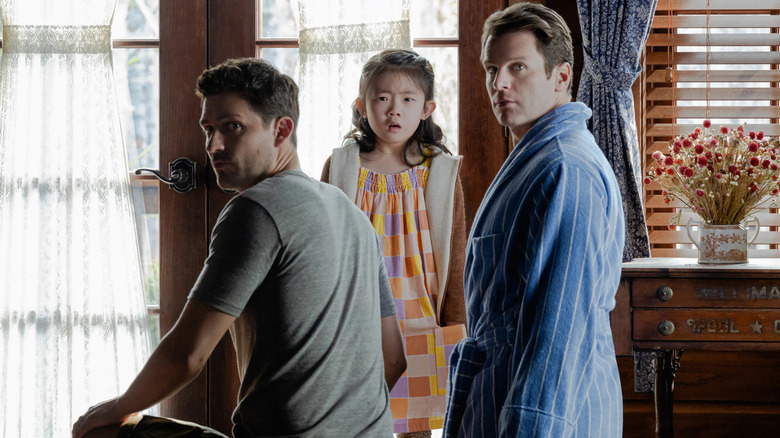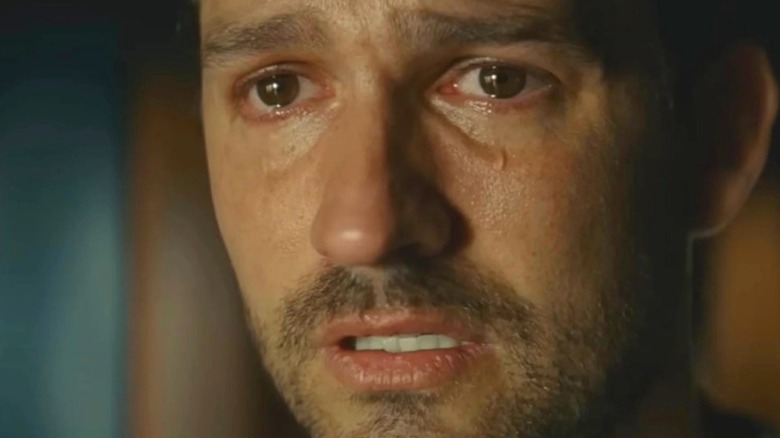Knock At The Cabin's Ben Aldridge Thinks The Movie Would Have Been Unwatchable If It Faithfully Adapted The Book
Spoilers ahead for "Knock at the Cabin" and Paul G. Tremblay's original novel, "The Cabin at the End of the World."
Though he's far from batting a thousand with original screenplays, M. Night Shyamalan's first attempt at adapting pre-existing source material — "The Last Airbender" — was famously his greatest disaster. As the only credited writer on his initial eight films, Shyamalan's failed blockbuster for Nickelodeon would become his first and only adaptation until 2021's "Old."
Now, after closing out his unsatisfying "Unbreakable" trilogy — Shyamalan's only multi-movie franchise, which sprung entirely from his own head — the writer-director is entering a phase of his career where adaptations are a new normal. His latest, "Knock at the Cabin," is based on the 2018 novel "The Cabin at the End of the World" by Massachusetts-based author and two-time winner of the Bram Stoker Award, Paul G. Tremblay.
The bulk of the film dutifully adapts Tremblay's work, lifting character descriptions, lines of dialogue, and action sequences straight from the page. In one major departure, however, Shyamalan — along with co-writers Steve Desmond and Michael Sherman, who partnered on the 2015 sci-fi horror short, "Monsters" — decided to radically alter a key moment, with ripple effects that completely reverse the novel's ending.
Whereas "Knock at the Cabin" concludes as optimistically as its premise allows, with Erik (Jonathan Groff) allowing Andrew (Ben Aldridge) to take his life in order to preserve some kind of future for their daughter, Tremblay had something much darker in mind for his readers. That is (one last spoiler warning!), in a struggle with Leonard (Dave Bautista), Andrew accidentally shoots and kills seven-year-old Wen.
To make matters worse, Wen's inadvertent death does not count as a sacrifice, and in refusing to lose another member of their family, Andrew and Erik condemn themselves to spend their remaining lives walking a ruined Earth. For British actor Ben Aldridge, whose character would've otherwise had his daughter's blood on his hands, changing the ending was preferable.
Where's the twist?
When Ben Aldridge ("Spoiler Alert," "Pennyworth," "Fleabag") spoke to The Hollywood Reporter this week, he said without this modification:
"I think it would've been unwatchable, and I'm so glad it was changed because I would've hated to have acted that. I could have, of course, but I like the choice Night made. Besides that choice, I was shocked by the end of the book, and I was shocked again by Night's change. But I think Night's change is potentially more satisfying for an audience member. In the book, that literary ending of 'what!?' works amazingly on the page, but as an audience member, there needs to be more satisfaction than that. So I respect Night's flip on that as well."
In addition to improving audience palatability, as Aldridge points out, the change might also send a better message. As Erik explains to Andrew in the finale, destiny chose their family to save humanity because their love is not bonded by blood but by intention and choice. The film, therefore, is more thematically consistent with the actual contribution parents of adoption make to the collective good by ensuring more children grow up in loving homes.
The real twist in "Knock at the Cabin" is how Shyamalan deviates from the source material to offer a more traditional cinematic conclusion. Contrasting that to "Old," which only fits in a surprise ending through a subplot that is absent in the Swiss graphic novel, "Sandcastle" on which it's based, perhaps his latest work is a sign Shyamalan is maturing as a writer and storyteller. If he continues making creative decisions that emphasize his films' themes rather than shock audiences out of obligation, Shyamalan's upcoming projects, adapted or original, might just keep the director on a hot streak.

